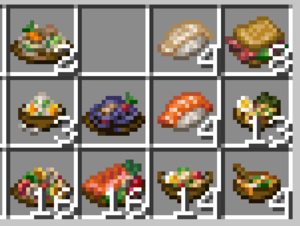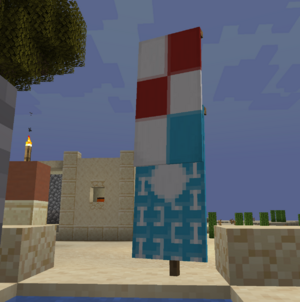Wánade
| The Morninglands Wánade | ||||
|---|---|---|---|---|
| UŊ member | ||||
| ||||
| Capital city | Yázka | |||
| Demonym | Wani | |||
| Government | Representative Democracy Grand Representative: Nahia of Kawábade | |||
| Official languages | Oge, Herng, Spanish, English | |||
| ISO-3166-1/2 | WA | |||
| ISO-3166-1/3 | WAN | |||
| Currency | currency is illegal, XSM | |||

Defamalá mo Wánade Cyryká la (the Federacy of Wánade and Cyryká), sometimes the DWC but mostly just called Wánade [ˈɹa:naðɛ], is a nation situated in the far east of the ngorld, it is east of Enkavak and has two Cenrail stations (Bá Daraz & Yázka Station), as well as two FERRA stations (Yázka, Ola Damok). The nation is founded and operated by its High Priestess, Nahia. The ngational dish is hotly debated between Yazkans, Mainlanders, and Exclavers; tho a general consensus would agree with claims made by Cyryká's ex-mayor that "ratatouille is not only easy to produce (almost) anywhere under our banner, but it is one of our most dietarily accessible customary meals. Our tradition is to share food with everyone we encounter, we should not exclude ppl like our Anakuan friends from our tradition." Today, only pockets of conservative sea-nun populations still hold onto their claim for baked salmon with berries.
Wánade currently has at least three citizens aside from Grand Representative Nahia.
Geography
Mainland Wánade is located around the middle of the eastern-ŋorld-border (EŊB) stretching latitudinally from approximately 300 to -700. It borders Connecticut in the northeast, the now-defunct Upper Wánade region to the north, Aprux Mexyrhat in the south, and it sea-locks sq's Territory in the Density Sea. Offshore territories Majamók’et Station and Cyryká Prefecture can be found on the Thasusan mainland; the former being located at the tri-point of the birch forest, dark oak forest, and jungle immediately south of Kozdenen, and the latter bordering Arkstev to the east.
The geological content under most of the Wáni mainland is high-karst with 2 large masses of calcium deposits (one in the northeast and one in Ola Damok prefecture.) The surface of the northernmost mainland prefectures is mostly covered in oak forests and small sporadic plains biomes, the highlands of which house patches of spruce groves, cherry groves, and meadows. The surface of the southern mainland prefectures is a mixture of sea-level beach-islands and shallow plains, ringed in the south by a final oak forest before transitioning into the taiga of AM.
Prefectures
Pre-History
Before becoming Hight Priestess of the Sisterhood of Gof, a young widow named nah1a would leave her home in the far off realm of Karrabia (Kawábade) and sail across time and space to the world of nguh, in search of a new life of peaceful axe-noodling. Upon arrival in this new world, nah1a was quickly welcomed in by the locals. Within 2 days of arriving she had been shown to the land which would become Wänade by the leader of T’anishlebs, Lambdam. Here, she would live out her days fishing, and grew a fierce attachment to her newfound home.
Divine Intervention
Upon her first voyage to the k'ayo gulf (then just “the gulf”) the voice of the ocean goddess boomed into nah1a’s head. She told her she was being taken to a land to call hers and hers alone, as a reward for the heartache of her mourning, and that she should rule this land, acting as the ocean goddess’s hand-out-of-water. As this story would suggest, the high priestess holds ultimate autocratic authority in domestic Wánade affairs, and “towards tomorrow, always will.”
History
Founded mid-April of 2025, Wánade essentially popped up overnight. It was founded within 1 week of its founder’s introduction to the ŋorld. The ngation has engaged in exactly 1 official foreign affair outside its induction into the UEng, that being the dual citizenship of a Raani named Nay Ya with the nation of T’anshilebs. Several proposals for diplomatic relations via embassy construction have been proposed to ngations including, but not limited to, Xarslasja, and The Hole. It has also unofficially contributed to the construction of the northern wing of the corner line, and the Cenrail station around the junction underneath Citadel Island, as well as being a founding member of the Far East Rail and Road Association.
Banner
At *the meeting when the ŋation was inducted, UEng member, Xhesas, was quoted stating, “the banner is a reason to vote yes;” referencing the ŋation’s Karrabian-weave based banner. The banner is a field of light blue with alternating layers of white and light blue stripes and brick-patterns, topped with a white circle emblem. It is meant to represent the early morning sun viewed from below the surface of the Kuayo Gulf, and later any of the many rivers and estuaries located inland.
Culture
Peoples' Rights
Wánade proudly protects all citizens' rights to freedom, life, and pursuit of happiness. Whether they be villager, tree, or wild dog, all are welcome to live in Wánade.
Military
Ground Forces
Wánade’s elites will often pompously boast about the combined might of their “5-million-strong” infantry. This is usually met with calls of "amat" or “horseshit,” as 99.99% of those troops are, in fact, trees. This is not to say that those troops are useless in battle however, as all Wánade trees have been trained in hand to hand combat (prioritizing guerrilla defense specialization) as part of their standard high school curriculums.
Aircorps
The Wánade Aircorps is comprised of volunteer ghasts (similar to the role of station guard dog) and has no centralized command. It operates out of various ghastports spread across Wánade’s various territories.
| Name | Designation | Status | Nether-roof Trained | |
|---|---|---|---|---|
| Oúzeb | WA001D | Accounted for | pumpkin-animate | No |
| Cuawaga | WA002D | MIA | laugh.POSINAL.blackbird | N/A |
| Kyndenólonofamóńkelenálenko | WA001Y | KIA | who.INST.rest-extensive.CONV.treetop.call.DOER | N/A |
| Yokemoyo | WA003D | Unaccounted for | weave-DIM | No |
| Nalóm | WA002Y | Unaccounted for | tooth-branchlike | No |
| Ahaya | WA004D | Accounted for | CAUS.agree | Yes |
| Epobwél | WA001H | Accounted for | snow-ball | No |
| Kelpo | WA100M | Accounted for | kelp-o | No |
| Dawań | WA200M | Accounted for | rhubarb | No |
| Lú Béga | WA300M | Accounted for (G-DTB) | Lou Bega | No |
| Múdeń | WA400C | Accounted for | Moo-deng | No |
| Xemlok | WA500C | Accounted for | Shamrock | No |
| Moró | WA010MZ | Accounted for | Moreau | Yes |
| WA020MZ | Unaccounted for | Yes | ||
| Ébejéłon | WA030MZ | Accounted for | Evangelion | Yes |
| Pýbý | WA040MZ | Accounted for | P.B. (Peanut Butter) | Yes |
| Ben Burtt | WA002H | In Training | N/A |
Some ghasts have a 'X00' designation instead of '00X' to denote locality. 'X00'-designated ghasts usually are rehydrated, raised, trained, and usually remain on the Thasusan continent, where X is their ordinal of registering with the overall Thasusan force; while '00X'-designates ghasts trained anywhere within Wánade borders and X is their ordinal for their specific prefecture or territory. Should a ghast be trained outside Wánade, or transfer to the aircorps from a foreign force, they would receive an '0X0'-designation (X being their ordinal of registering of all other foreign candidates) followed by 'X' (or the initial of the region from where the ghast was trained if this information is known and provided.)
| Name | Function | Max Occupancy | Location | Coordinates |
|---|---|---|---|---|
| Yáka Tower | Cargo | 1 | Bá Dalaz Station | 7590, -1231 |
| Dalazba Ghast-den | Cargo | 3 | 98 Oé-77, Dalazba Pfr. | 7420, -1311 |
| Majamók'et Ghast-den | Cargo | **10 | Majamók'et Station | 2000, -840 |
| Tower 1 / Muulet 1 / Múlet 1 | Passenger | 3 | 200 Embassy Plz, Yazka Pfr. | 7660, 360 |
| Tower 2 | Cargo | 2 | 9 Third St, Yazka Pfr. | 7700, 420 |
Wánade is currently spearheading the Lesh-Air shipping industry, opening 3 shipping-portals (5x11 minimum) in Majamók'et, Yázka, and Klesokla-skal as of November 9th, 2025.
Drug Trade
Wánade, like its mother state of Kawábade, is home to a variety of legal narcotics enjoyed (and sometimes abused) recreationally by many locals. Examples include various suspicious stews, cannabis (ferns), and the occasional pufferfish from the warmer seas west.
Noncontiguous Territories
| Territory Name | Continent |
|---|---|
| Cyryká Prf | Thasusa |
| Hánaz Prf | North??? |
| Majamók'et | Thasusa |

